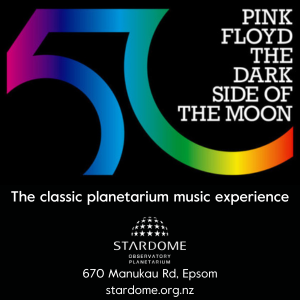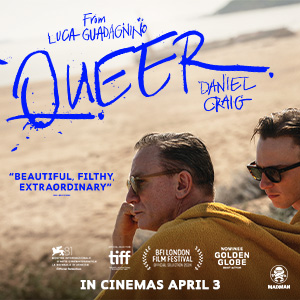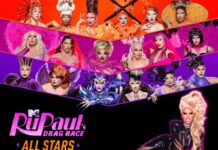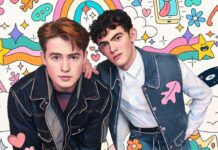The queer women behind, We Were Dangerous, writer Maddie Dai and director Josephine Stewart-Te Whiu, discuss the personal inspirations behind this timely tale of autonomy, freedom and independent spirit.
Filmed in Christchurch, We Were Dangerous tells the story of Nellie, Daisy and Lou, three girls labelled to be so uncivilised that they are sent to a school for delinquent girls on a remote island, governed by a stern matron in 1950s New Zealand. The three friends become each other’s family, managing to find joy in their imprisoned lives.
“I was living in London in lockdown,” Maddie tells us when asked what inspired the film.
“I was desperate to go home, and writing a movie set in NZ seemed like at least one way to get there. It was my first film script. I emailed it to my favourite production company (Piki Films), and truly, it is wild that it worked. Homesickness is such a powerful creative force!”

Taika Waititi’s Piki Films has previously produced The Breaker Upperers, and Maddie says she also wanted to write a female buddy comedy with spirited girls at the centre of it.
“The kind of funny, generous, irreverent women I grew up with: my sisters, cousins, aunts and peers. Additionally, I had a great-great-grandfather who was imprisoned on Matiu/Somes Island in Wellington, and that seemed interesting to me – both so close to civilisation yet entirely removed. I wanted to think about colonisation, removed from the initial act of subjugation when it is present in norms and institutions and in ourselves.”
Colonisation’s impact is a clear yet subtle theme of We Were Dangerous, as the deluded Matron (played expertly by Rima Te Wiata) advises the girls, ’Life’s easier if you don’t resist,’ while working hard to deny her own Māori heritage.
The timing of We Were Dangerous’ release could not be more pertinent with the recent release of findings from The Royal Commission’s Inquiry into Abuse in Care. Maddie had followed the investigation closely.
“It’s horrible details like the humiliation of cutting hair as punishment,” she notes.
“We did early readings of the script with people who had endured abuse in state care, and that added so much humanity and colour to the stories. It gave us permission to see the humour and the friendships as tools of resistance and survival. We heard hilarious tales of girls using the sanitary pad incinerators to light their cigarettes and some great impressions of their own matrons. When you’re overwhelmed with such staggering numbers of people who experienced abuse, I think remembering the humanity of people is so important.”
 In We Were Dangerous, the abuse of girls starts small and spirals quickly. Death threats become part and parcel of admonishing bad behaviour. Enforced repression of unmarried women, Māori and homosexuality are the norm.
In We Were Dangerous, the abuse of girls starts small and spirals quickly. Death threats become part and parcel of admonishing bad behaviour. Enforced repression of unmarried women, Māori and homosexuality are the norm.
“There are so many corners of NZ’s history that are dark, devastating and tough to contend with, but it’s so crucial for us all to examine the parts of our culture and systems that encouraged or allowed this abuse. The treatment of people on the fringes and the way they had been removed from society – isolated, contained, silenced – to ‘protect’ the homogenous mainstream is such a pernicious but constant trend.”
Such a pernicious and constant trend that, staggeringly, in 2024, a woman’s right to abortion is a key topic of debate in the US Elections.
But We Were Dangerous Director Josephine Stewart-Te Whiu isn’t surprised. Disappointed, but not surprised.
“It’s the same old shit, different day. We were in pre-production for the film when ‘Roe V Wade’ was overturned. Last year was the first time menstrual products were finally tested with real blood. Endometriosis is so poorly understood, and a huge number of people are suffering from it because women’s bodies have been largely ignored in medical research and policy. A 2023 UN study revealed it will take 286 years to close gender gaps in legal protection and to remove discriminatory laws against women, 140 years for equal representation in positions of power, and at least 40 years to achieve gender parity in national parliaments….” Josephine lists, clarifying her desire to direct We Were Dangerous’ themes. “It’s not good enough. That’s why we need reminding.”

One of the film’s three protagonists, Lou, arrives on the island branded a ‘sexual deviant’ for her attraction to women, but is still welcomed by Nellie and Daisy.
“Although this is a period film, I threw a very contemporary lens on it,” Josephine tells us. “Maddie and I made a very deliberate choice that our queer character would not be ostracised by her peers for her queerness. Amongst her friends, she just is, and she can just be without feeling othered (the way it should be).”
With potential government-led reversals on LGBTQ+ inclusion being taught in schools, the increased chances of a real-life Lou being ostracised play on Josephine’s mind.
“This is a disturbing policy trend, but I think we need to maintain hope and keep educating people. Authentic queer representation is key to this. We’ve always been here, and we will always be here,” she says.
Pakeha and from a wealthy background, Lou must ultimately decide if she will put herself on the line to protect her less privileged friends. A decision that parallels that of many in our community. Josephine is forthright about the path people should choose.
“We can’t buy into the fear that’s being peddled about us. The most important thing we can do at this moment in time is to protect our trans community and trans kids,” she states.
Growing up in Auckland’s central suburbs, Josephine’s own coming out in her teens was the opposite of Lou’s.
 “My mum was always very involved in the queer community and an ally. As a result, I grew up around a number of beautiful humans on the queer spectrum. She didn’t skip a beat when I told her. She just pulled me into her arms, hugged me and wondered aloud why I didn’t tell her sooner. My school friends at the time was a different experience. I went to a conservative girls’ school (which I attended as an ‘out-of-zone’ student). I lost a lot of ‘friends.’ However, the ones that stuck by me are dear to me to this day. They even travelled to Sydney to support me screening the film there!”
“My mum was always very involved in the queer community and an ally. As a result, I grew up around a number of beautiful humans on the queer spectrum. She didn’t skip a beat when I told her. She just pulled me into her arms, hugged me and wondered aloud why I didn’t tell her sooner. My school friends at the time was a different experience. I went to a conservative girls’ school (which I attended as an ‘out-of-zone’ student). I lost a lot of ‘friends.’ However, the ones that stuck by me are dear to me to this day. They even travelled to Sydney to support me screening the film there!”
Maddie, meanwhile, sees coming out as a still-ongoing process.
“Someone from my primary school could be reading this and feeling deeply unsurprised,” she muses, before offering some remarkable insight on the impact her sexuality has had on her life.
“I felt a lot of fear, and if I’m honest with myself, that fear probably propelled me out of NZ. It just felt hard to explore in the environment I was in. I suppose the inverse of being able to explore my queerness overseas was that it led to a highly compartmentalised life. I was basically out in some time zones and not in others…. Obviously, this was untenable – for me and for anyone I was with,” she tells us, before reflecting on the same queer survival instinct that took her through high school.
“My whole strategy when I was young was to be so fun and exciting that anyone who wanted to cut me out of their life for being queer would at least feel some pang of FOMO and regret. But honestly, my family and friends were largely completely supportive, and I wasn’t required to do anything quite so melodramatic.”
It’s experiences like this that helped forge We Were Dangerous’ themes of empathy, resilience and strength, which could only be crafted by a queer mind.
“Queerness contains such exciting multitudes; it makes you a master of subtext and yet holds such a deep reverence for being over the top. Small, subtle moments of yearning are celebrated alongside flamboyant expressions of joy. It allows you to throw away norms but also helps you feel connected to those who charted a course on your behalf. It forced me to be brave, which all creative pursuits require… and the best writing requires you to tap into every little truth or fear or hope, so being an outsider is a useful experience. It makes you observant. It means you take nothing for granted about your own point of view.”
With its powerful point of view, We Were Dangerous, is out in cinemas nationwide now.






















